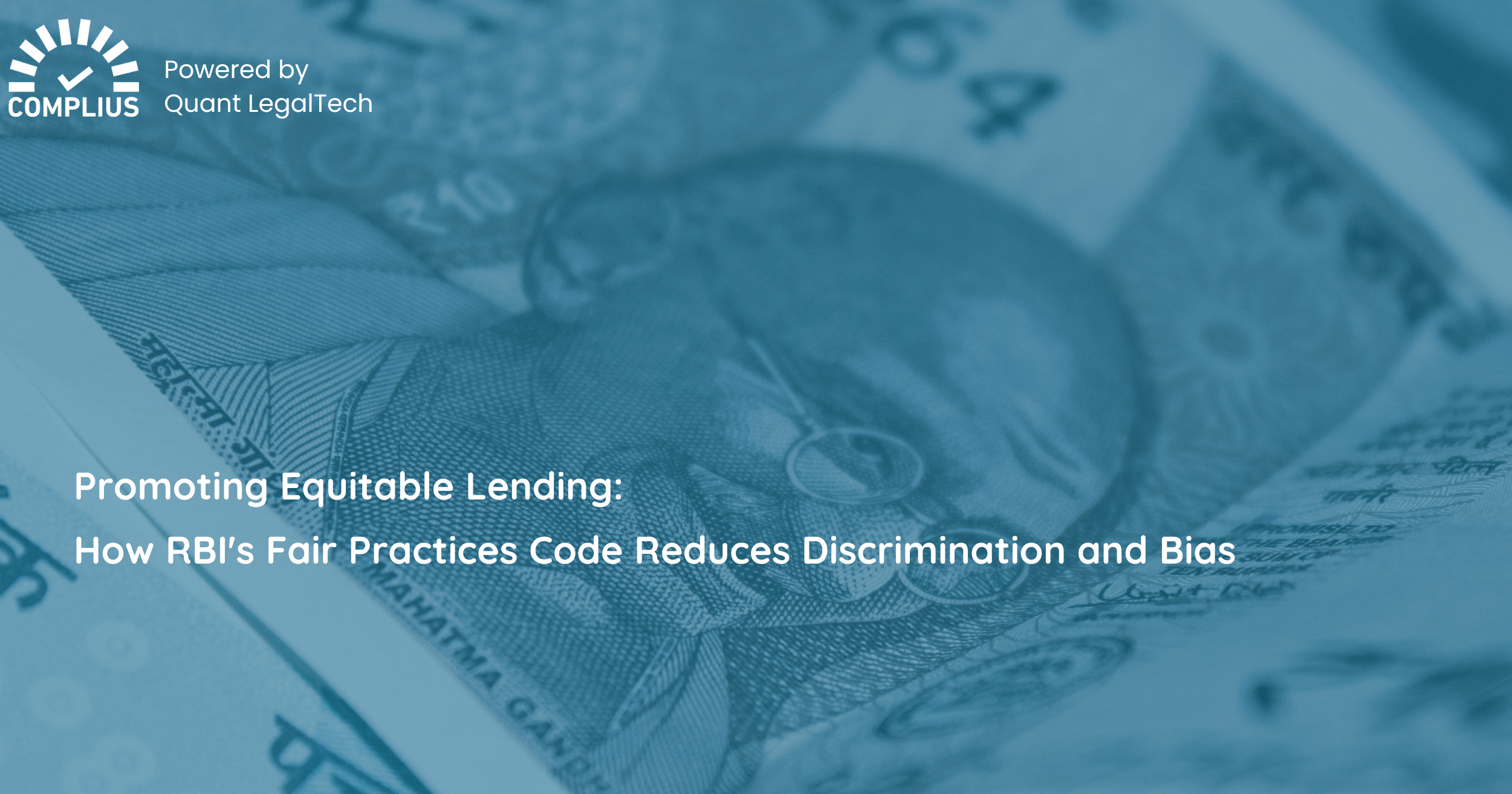Choose another country or region to see content specific to your location
Promoting Equitable Lending: How RBI’s Fair Practices Code Reduces Discrimination and Bias
October 03, 2023

The Reserve Bank of India’s (RBI) Fair Practices Code and its recent guidelines regarding the disclosure and imposition of penal interest dated August 18, 2023 contribute to reducing discrimination and bias in lending and promote equitable lending practices. Here’s how these measures work together and how legal-tech and AI are evolving to address these challenges:
RBI’s Fair Practices Code:
Language Accessibility: The FPC mandates that all communications with borrowers should be in a language understood by the borrower. This ensures that borrowers of diverse linguistic backgrounds can comprehend the terms and conditions, reducing linguistic discrimination.
Transparency: The FPC emphasizes the importance of providing borrowers with all necessary information about loans, such as interest rates, charges, and terms, in a clear and understandable manner. Transparent communication reduces the likelihood of discrimination based on a lack of understanding.
Non-Coercive Recovery Methods: The FPC discourages coercive recovery methods, such as harassment or the use of muscle power. This protects borrowers from unfair and discriminatory treatment during the loan recovery process.
Uniformity in Loan Terms: The FPC promotes uniformity in loan terms and conditions, preventing discrimination in interest rates, charges, or penalties. This ensures that borrowers are treated fairly and equally.
Grievance Redressal Mechanism: The FPC requires NBFCs to establish a grievance redressal mechanism, allowing borrowers to address any concerns or disputes. This mechanism provides borrowers with a way to report discriminatory or biased practices and seek resolution.
RBI’s Guidelines on Penal Interest/Charges:
-
These guidelines emphasize RBI’s intent to regulate penal interest/charges to encourage credit discipline rather than revenue generation. They aim to prevent excessive charges that may disproportionately affect specific groups of borrowers.
-
The guidelines mandate reasonable and non-discriminatory penal charges, ensuring fairness across loan categories and purposes.
-
Relevant entities (REs) must transparently disclose penal charges and their reasons in loan agreements, enhancing transparency and reducing disputes.
-
Borrowers are promptly informed of applicable penal charges when reminders for non-compliance are issued, promoting equitable treatment and borrower awareness.
Consequences of Non Compliance
Non-compliance with the Reserve Bank of India (RBI) Fair Practices Code (FPC) can have significant regulatory consequences in the financial sector. RBI wields the authority to impose monetary fines on non-banking financial companies (NBFCs) and regulated entities that fall short of complying with the Fair Practices Code (FPC). In severe cases, it holds the power to revoke or cancel the license or registration of an NBFC or regulated entity, effectively halting their operations and barring them from participating in financial activities.
Furthermore, the RBI can curtail their capacity to expand, introduce new financial products, or engage in specific transactions until they demonstrate full compliance with the FPC. Non-compliant entities may also face increased regulatory scrutiny, which can encompass more frequent inspections, audits, and heightened reporting requirements. Non-compliance may lead to disqualification from certain regulatory benefits or exemptions, including those related to capital adequacy or risk management requirements. Additionally, it can have a detrimental impact on the credit rating of an NBFC or regulated entity, rendering it more challenging and costly for them to access capital and funding. To rectify their non-compliance, these entities may be obligated to furnish more frequent and detailed progress reports to the RBI
To mitigate these regulatory consequences, NBFCs and regulated entities should prioritize compliance with the RBI FPC. They should establish robust compliance programs, conduct regular internal audits, and provide ongoing training to employees to ensure that their operations and practices align with regulatory requirements.
Legal-tech and AI Solutions:
Compliance Monitoring: Legal-tech and AI solutions can monitor REs’ adherence to the RBI’s guidelines on penal interest/charges. By analyzing loan documents and practices, these technologies can identify instances of non-compliance or discriminatory behavior.
Customer Education: AI-driven chatbots and digital assistants can educate borrowers about their loan terms, penal charges, and compliance requirements. This empowers borrowers to make informed decisions and reduces the risk of unintentional non-compliance.
Data Analytics: Legal-tech and AI can analyze lending data to detect patterns of discrimination or bias, helping regulators and REs identify and rectify potential issues.
Complaints Handling: AI can assist in handling customer complaints related to penal charges by ensuring prompt and consistent responses, helping resolve disputes, and preventing discrimination in the complaint resolution process.
Policy Compliance: Legal-tech solutions can automate the monitoring of REs’ policy frameworks to ensure compliance with the RBI’s guidelines on penal charges.
In summary, RBI’s Fair Practices Code and guidelines on penal interest/charges work together to promote equitable lending and reduce discrimination. Legal-tech and AI solutions play a crucial role in monitoring, compliance, education, and dispute resolution, helping to address these challenges and mitigating the risk of non compliance.